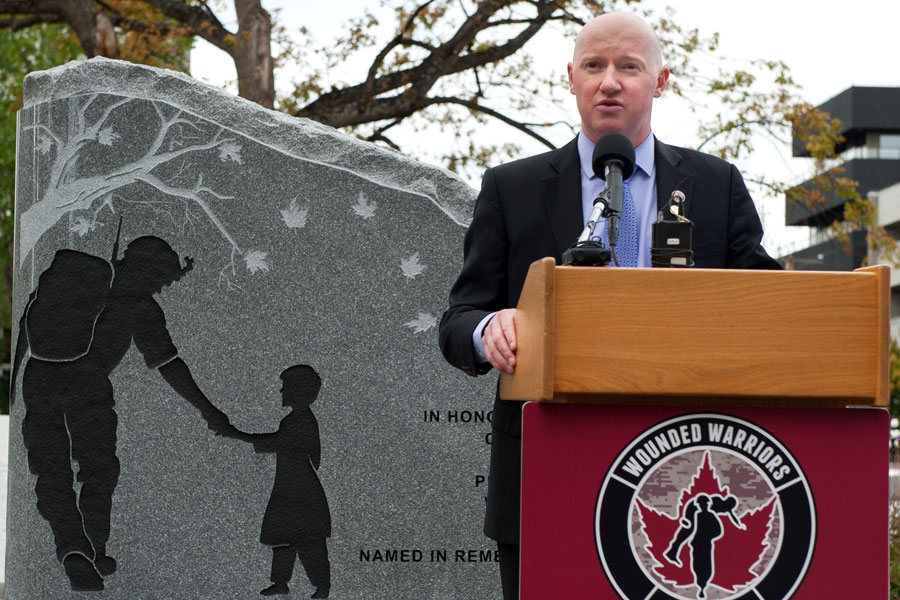Wounded Warriors launches new health program
By Lookout on Oct 23, 2017 with Comments 0

Scott Maxwell – Executive Director, Wounded Warriors Canada. Credit: John’s Photography
Peter Mallett, Staff Writer ~
A ground-breaking support program for military personnel, veterans and first responders suffering from Post-Traumatic Stress Disorder (PTSD) and other forms of trauma has launched in Victoria.
With the new B.C. Afghanistan Memorial at Pioneer Square as a backdrop, Wounded Warriors Canada announced the introduction of its Trauma Resiliency Program (TRP).
The Oct. 12 announcement came a day prior to the kick-off of the group-based training program in Sooke, the opening phase of an intensive eight-day trauma-resilient skills development training program.
Developed by Dr. Tim Black, Associate Professor of Counselling Psychology at the University of Victoria, the program is being administered by the non-profit charity.
The program is designed for people diagnosed with trauma-related injuries.
Scott Maxwell, Executive Director of Wounded Warriors Canada, says all 60 spots for the roll-out at four separate trial sites were taken within a few days of the program’s introduction.
“This is a completely new and first-of-its kind program,” said Maxwell. “The demand in the country for TRP is significant, and with our launch complete we now need to focus our efforts on making the program available to anyone who needs it.”
The initial phase of the TRP, called Regulation for Recovery Training, is a three-day course on the nature of trauma-related injuries. The opening phase is designed to educate attendees on the delivery models of the program.
The second and final phase of the course, Advanced Recovery Training, requires five consecutive days of intensive study with groups of approximately six people. At this phase they will develop skills, tools and resources needed in their recovery.
“The program is trying to teach people resiliency through their injury and learn the skills and tools to manage it,” says Maxwell. “There are all sorts of recovery tools available, but the goal is to equip each individual with the right tools so they come out of the process more resilient than before starting TRP.”
Corporal (Retired) Jason Campbell of Chilliwack, B.C. took part in the opening phase of the program. He was a member of the Princess Patricia’s Canadian Light Infantry’s First Battalion for over 14 years and did a tour of Kosovo in 1999. He didn’t realize he suffered from PTSD until after his medical release from the military in 2011.
Campbell has already participated in three separate Wounded Warriors Battlefield Bike Rides, a cycling-oriented treatment program for military, veterans and first responders that takes them to some of Europe’s most famous battle sites. He noticed during this summer’s Battlefield Bike Ride in France that one of his PTSD symptoms – an overwhelming desire to be isolated – was getting worse.
“Taking part in the opening phase [of TRP] was very helpful to me, and I’m excited to see what will happen in the second phase of the program. I truly believe this program is going to change things and will get other trauma sufferers lucky enough to get a spot in this program the help they need.”
The concept for TRP was developed eight months ago by Wounded Warriors Canada. Dr. Black, who researches and lectures in the field of PTSD and military-civilian transition training, agreed to volunteer his services. He is being assisted by Alex Stirling, a clinical advisor who specializes in group and individual approaches to treating trauma. The University of Victoria Counselling Psychology graduate had previously worked with Dr. Black after he had co-founded Wounded Warriors’ Program COPE (Couples Overcoming PTSD Everyday).
Black says living and recovering from PTSD requires a “tremendous amount of resiliency” and believes effective education, skills training and strategic use of responses can be a huge aid in the healing process. He is hopeful the latest effort will help to continue the ongoing effort to extinguish the stigma surrounding trauma-related injuries, and further normalize understanding and acceptance.
“We want to change the culture around PTSD in our society, particularly with veterans and first responders who are exposed to traumatic events on a regular basis,” said Dr. Black. “We are shifting away from the illness models and helping people understand that the ‘blood, sweat and tears’ required for recovering from PTSD is something that people can be proud of and even share within their communities. In an era of violence and ever-increasing trauma, recovery becomes an act of courage, resistance and resilience.”
For more information about TRP, visit Wounded Warriors Canada.
Filed Under: Top Stories
About the Author:





